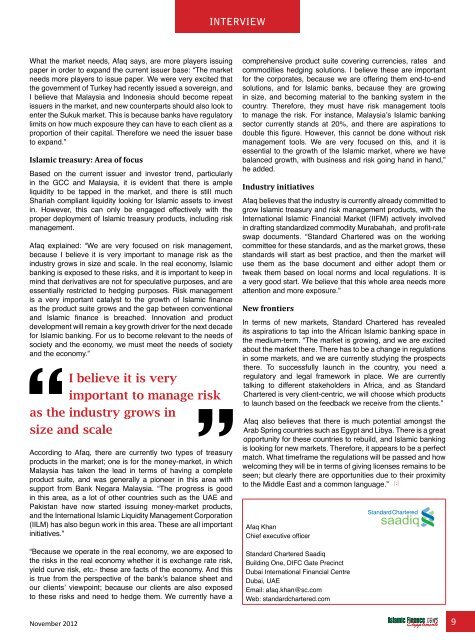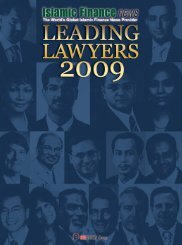Sukuk & Capital Market - Islamic Finance News
Sukuk & Capital Market - Islamic Finance News
Sukuk & Capital Market - Islamic Finance News
Create successful ePaper yourself
Turn your PDF publications into a flip-book with our unique Google optimized e-Paper software.
interview<br />
What the market needs, Afaq says, are more players issuing<br />
paper in order to expand the current issuer base: “The market<br />
needs more players to issue paper. We were very excited that<br />
the government of Turkey had recently issued a sovereign, and<br />
I believe that Malaysia and Indonesia should become repeat<br />
issuers in the market, and new counterparts should also look to<br />
enter the <strong>Sukuk</strong> market. This is because banks have regulatory<br />
limits on how much exposure they can have to each client as a<br />
proportion of their capital. Therefore we need the issuer base<br />
to expand.”<br />
<strong>Islamic</strong> treasury: Area of focus<br />
Based on the current issuer and investor trend, particularly<br />
in the GCC and Malaysia, it is evident that there is ample<br />
liquidity to be tapped in the market, and there is still much<br />
Shariah compliant liquidity looking for <strong>Islamic</strong> assets to invest<br />
in. However, this can only be engaged effectively with the<br />
proper deployment of <strong>Islamic</strong> treasury products, including risk<br />
management.<br />
Afaq explained: “We are very focused on risk management,<br />
because I believe it is very important to manage risk as the<br />
industry grows in size and scale. In the real economy, <strong>Islamic</strong><br />
banking is exposed to these risks, and it is important to keep in<br />
mind that derivatives are not for speculative purposes, and are<br />
essentially restricted to hedging purposes. Risk management<br />
is a very important catalyst to the growth of <strong>Islamic</strong> finance<br />
as the product suite grows and the gap between conventional<br />
and <strong>Islamic</strong> finance is breached. Innovation and product<br />
development will remain a key growth driver for the next decade<br />
for <strong>Islamic</strong> banking. For us to become relevant to the needs of<br />
society and the economy, we must meet the needs of society<br />
and the economy.”<br />
I believe it is very<br />
important to manage risk<br />
as the industry grows in<br />
size and scale<br />
According to Afaq, there are currently two types of treasury<br />
products in the market; one is for the money-market, in which<br />
Malaysia has taken the lead in terms of having a complete<br />
product suite, and was generally a pioneer in this area with<br />
support from Bank Negara Malaysia. “The progress is good<br />
in this area, as a lot of other countries such as the UAE and<br />
Pakistan have now started issuing money-market products,<br />
and the International <strong>Islamic</strong> Liquidity Management Corporation<br />
(IILM) has also begun work in this area. These are all important<br />
initiatives.”<br />
“Because we operate in the real economy, we are exposed to<br />
the risks in the real economy whether it is exchange rate risk,<br />
yield curve risk, etc.- these are facts of the economy. And this<br />
is true from the perspective of the bank’s balance sheet and<br />
our clients’ viewpoint; because our clients are also exposed<br />
to these risks and need to hedge them. We currently have a<br />
comprehensive product suite covering currencies, rates and<br />
commodities hedging solutions. I believe these are important<br />
for the corporates, because we are offering them end-to-end<br />
solutions, and for <strong>Islamic</strong> banks, because they are growing<br />
in size, and becoming material to the banking system in the<br />
country. Therefore, they must have risk management tools<br />
to manage the risk. For instance, Malaysia’s <strong>Islamic</strong> banking<br />
sector currently stands at 20%, and there are aspirations to<br />
double this figure. However, this cannot be done without risk<br />
management tools. We are very focused on this, and it is<br />
essential to the growth of the <strong>Islamic</strong> market, where we have<br />
balanced growth, with business and risk going hand in hand,”<br />
he added.<br />
Industry initiatives<br />
Afaq believes that the industry is currently already committed to<br />
grow <strong>Islamic</strong> treasury and risk management products, with the<br />
International <strong>Islamic</strong> Financial <strong>Market</strong> (IIFM) actively involved<br />
in drafting standardized commodity Murabahah, and profit-rate<br />
swap documents. “Standard Chartered was on the working<br />
committee for these standards, and as the market grows, these<br />
standards will start as best practice, and then the market will<br />
use them as the base document and either adopt them or<br />
tweak them based on local norms and local regulations. It is<br />
a very good start. We believe that this whole area needs more<br />
attention and more exposure.”<br />
New frontiers<br />
In terms of new markets, Standard Chartered has revealed<br />
its aspirations to tap into the African <strong>Islamic</strong> banking space in<br />
the medium-term. “The market is growing, and we are excited<br />
about the market there. There has to be a change in regulations<br />
in some markets, and we are currently studying the prospects<br />
there. To successfully launch in the country, you need a<br />
regulatory and legal framework in place. We are currently<br />
talking to different stakeholders in Africa, and as Standard<br />
Chartered is very client-centric, we will choose which products<br />
to launch based on the feedback we receive from the clients.”<br />
Afaq also believes that there is much potential amongst the<br />
Arab Spring countries such as Egypt and Libya. There is a great<br />
opportunity for these countries to rebuild, and <strong>Islamic</strong> banking<br />
is looking for new markets. Therefore, it appears to be a perfect<br />
match. What timeframe the regulations will be passed and how<br />
welcoming they will be in terms of giving licenses remains to be<br />
seen; but clearly there are opportunities due to their proximity<br />
consulting www.<strong>Islamic</strong><strong>Finance</strong>Consulting.com<br />
www.<strong>Islamic</strong><strong>Finance</strong>Events.com<br />
to the Middle East and a common language.”<br />
Afaq Khan<br />
Chief executive officer<br />
Standard Chartered Saadiq<br />
Building One, DIFC Gate Precinct<br />
Dubai International Financial Centre<br />
Dubai, UAE<br />
Email: afaq.khan@sc.com<br />
Web: standardchartered.com<br />
www.<strong>Islamic</strong><strong>Finance</strong><strong>News</strong>.com<br />
www.<strong>Islamic</strong><strong>Finance</strong>Training.com<br />
www.MIFforum.com<br />
www.MIFmonthly.com<br />
www.MIFtraining.com<br />
www.REDmoneyBooks.com<br />
saadiq<br />
November 2012 9

















